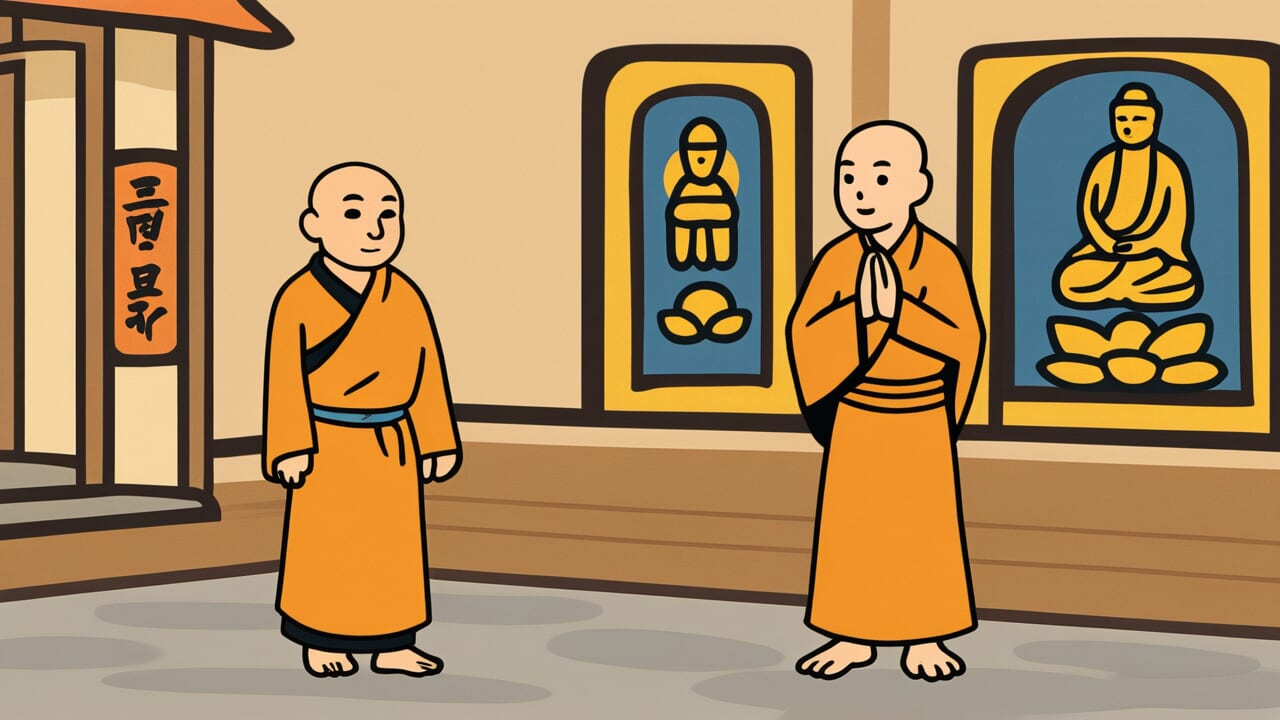How to Read “From novice monk to elder monk”
Shami kara chōrō
Meaning of “From novice monk to elder monk”
“From novice monk to elder monk” is a proverb that teaches the importance of diligence. It says that even an apprentice monk can become a respected elder through continuous effort.
The proverb shows that anyone who starts at the bottom can reach the highest position. This happens through steady work and ongoing dedication.
People use this saying to encourage someone who is inexperienced now but has potential to grow greatly in the future. It also helps people motivate themselves.
No matter how low your current position is, the path will open if you keep trying. The proverb expresses this hope.
Today, people understand it as showing growth possibilities in any field. A new employee can become a company president. A beginner can become an expert in their field.
Starting at a low point is not a disadvantage. What matters is how much effort you put in from there. The proverb expresses this positive view of life.
Origin and Etymology
Clear written records about the origin of this proverb are limited. However, the components of the phrase reveal an interesting background.
“Shami” refers to an apprentice monk in Buddhism, someone training before becoming a full monk. The word comes from the Sanskrit “shramanera.”
A shami is a young monk who practices while following ten precepts. “Chōrō” means an elder monk with years of training, deep enlightenment, and rich experience.
Since Buddhism came to Japan, temples have maintained strict training hierarchies. Someone who enters as a shami performs daily services, studies scriptures, and does labor called samu.
This process is never smooth. It often takes decades of steady practice.
The proverb likely emerged from this Buddhist training system. Even someone starting at the lowest position can eventually reach the respected status of elder.
This requires unwavering effort and dedication. The proverb carries this hopeful message.
The Buddhist teaching of “growth through practice” flows at the foundation of this proverb.
Usage Examples
- He started as a high school graduate doing factory floor work, but from novice monk to elder monk, he now serves as factory manager
- I’m still a beginner, but from novice monk to elder monk—if I practice steadily every day, I should improve
Universal Wisdom
Behind the proverb “From novice monk to elder monk” lies a fundamental human desire and anxiety. It addresses the question: “I’m inexperienced now, but can I grow someday?”
Everyone is a beginner at some point in life. When you jump into a new environment, everyone around you seems more skilled. This makes you anxious.
Haven’t we all experienced this feeling? At such times, people seek hope. “Will this gap ever close?” “Do I have potential too?”
The proverb points to the power of two elements: time and effort. Human growth doesn’t happen overnight. But our ancestors understood the truth that it accumulates steadily.
It might take decades for a novice monk to become an elder. But this long journey is exactly what forms deep wisdom and character.
What’s interesting is that this proverb emphasizes “diligence” rather than “genius” or “talent.” Not inborn ability, but daily effort leads people to greater heights.
This way of thinking shows that everyone has equal opportunities. It presents a hopeful view of humanity.
Believing in human potential—that is the core of this proverb.
When AI Hears This
When you observe a fertilized egg becoming a nerve cell, you notice something interesting. The cell progresses from “a state where it can become anything” through “a pre-nerve cell stage” to “a complete nerve cell.”
This pathway follows a strict order. You cannot skip intermediate stages and jump straight to the final form. This is called “stepwise differentiation.”
Even more interesting is the irreversibility of this process. Once a cell becomes a nerve cell, it basically cannot return to being a muscle cell.
Professor Shinya Yamanaka’s iPS cell research won the Nobel Prize in 2012 precisely because it broke through this “no going back” principle using special methods.
In normal biological systems, differentiation is one-way.
The path from novice monk to elder monk has exactly the same structure. An apprentice monk cannot suddenly reach the state of an elder with decades of training experience.
Intermediate stages are necessary. This isn’t just a social rule. It may reflect biological constraints where the human cognitive system itself can only mature in stages.
Neuroscience research shows that expert brains have physically different wiring than beginner brains. In other words, each stage of training is the “differentiation state” of the cell group called the brain itself.
Lessons for Today
What this proverb teaches modern people is that “the direction you’re heading” determines your life, not “where you are now.”
In modern society, we tend to get anxious when results don’t come quickly. When you see others’ success on social media, you might feel behind and get discouraged.
However, as the path from novice monk to elder monk shows, real growth takes time.
What matters is moving forward a little each day. Even if what you learn today doesn’t help immediately tomorrow, it definitely accumulates inside you.
Even if you don’t know left from right at a new workplace, working sincerely every day will make you someone people rely on in a few years.
This proverb teaches you not to rush. At the same time, it conveys the importance of not neglecting effort.
All elders were once novice monks filled with anxiety. The difference between them and you isn’t talent. It’s only the amount of time and effort they’ve accumulated.
So you can start today. The seed to become an elder is already planted within you.



Comments